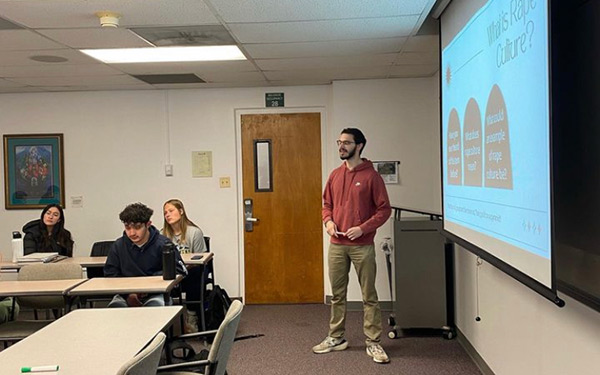
Victim Advocacy and Violence Prevention
Location:
Student Center 217D
Hours:
Monday–Friday
8:30 a.m.–5 p.m.
Contact:
vavp@regis.edu
Victim Advocacy and Violence Prevention (VAVP) offers a variety of presentations on topics of sexual violence prevention and education. VAVP can work with your group/organization/class/department to tailor a training session to your specific needs. Please request at least two weeks before the date of the presentation requested, especially for a customized conversation for a group.
A VAVP staff member will contact you to confirm your session request and schedule a meeting with representative(s) from your organization. Please note that we require 45 minutes to one and a half hour presentations. If you have any questions about programs, or wish to discuss your program with VAVP staff, please email vavp@regis.edu.

Violence Prevention Educators (VPE) are trained leaders who provide in-depth and ongoing training and programs about relationship violence, sexual violence, harassment, stalking, and related topics to the Regis campus community. At the beginning of the new school year the Victim Advocacy and Violence Prevention (VAVP) office provides opportunities for Regis students to apply for VPE positions. As leaders in the community, they are involved in the design of prevention and education programs and their implementation. Violence Prevention Educators are actively engaged in campus awareness activities, classroom presentations, orientations, and educational presentations to various campus groups.
Consent @ Regis
This interactive program helps participants understand the definition of consent as it pertains to the sexual misconduct policy at Regis University, the Stated of Colorado, and help develop the skills needed to communicate. Participants will learn about the importance of respecting the personal boundaries of others.
#RelationshipGoals
This program will explore the skills needed to show love and elements to be able to build healthy relationships. Participants will be able to identify various healthy and unhealthy relationship behaviors.
Preventing Sexual Harassment in our Spaces
Are you confident that your community understands how to address sexual harassment and how to discourage a hostile environment? This program presents what sexual harassment looks like in academic settings, in the workplace, and in specific communities. Participants will be able to recognize various forms and learn how to create an inviting climate.
Context is Key: Recognizing and Responding to Stalking on College Campuses
This program explores the prevalence and dynamics of stalking on college campuses and provides practical tools to better keep students safe. Though stalking victimization is prevalent among young adults and covered under the Clery Act, stalking is rarely addressed on various college campuses to the same degree as intimate partner and/or sexual violence. Participants will be able to identify stalking behaviors and utilize tools to keep safe from stalking victimization.
Drug-facilitated Sexual Assault
Alcohol and other drugs are often used by perpetrators to incapacitate their victims. This program helps participants identify warning signs, what to do if there is suspicion of being drugged, and steps to reduce the risk of drug-facilitated sexual assault.
Dismantling Rape Culture
This program examines the sociocultural context of sexual violence and victim blaming. The program explores the links between objectification and sexualization of violence in the media, and how this contributes to rape myth acceptance, victim blaming, and sexual assault. Participants will gain an understanding of the negative effects of blame on sexual violence survivors, and develop strategies to interrupt victim blaming and promote positive cultural change surrounding sexual violence.
Healthy Masculinity
You’ve probably heard expressions like "man up" or “real men don’t cry.” While the concept of gender is often associated with women, statements like these reflect gendered expectations for men too. "Making Men" is a group lead by a current Violence Prevention Educator (VPE) who engages the community in healthy conversations regarding stereotypes, mental health, hot topics, and how to promote healthy masculinity.
Interrupting the "Red Zone"
The Red Zone is the period of time between mid-August and Thanksgiving Break where statistically more than 50% of campus sexual assault incidents occur. This program helps participants examine what it is, how is occurs, and what we can do about it.
Bystander Intervention Training
The Bystander Intervention Training (BIT) program teaches students about interpersonal violence, consent, and bystander intervention skills. Upon completion of the training, students will know how to safely intervene in situations that could immediately lead to violence and how to interrupt a culture that is permissive to interpersonal violence. Students will acquire intervention tools to use in situations that seem risky in order to become effective and active bystanders. The Bystander Intervention Training program discusses topics including intimate partner violence, sexual assault, stalking, harassment, survivor empathy, and consent. Our BIT training can be 60mins or 90mins.
Supporting a Survivor
Supporting a Survivor is a program that explains the impact of trauma for victims of violence and how the Regis community can support them through their healing journey.
Drug-facilitated Assault
Drug-facilitated sexual assault occurs when alcohol or drugs are used to compromise an individual's ability to consent to sexual activity. This program will show what drug facilitated assault looks like, substances used, what to look for as an active bystander, and resources.

Location:
Student Center 217D
Hours:
Monday–Friday
8:30 a.m.–5 p.m.
Contact:
vavp@regis.edu